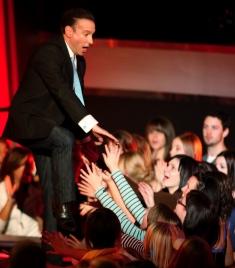To say that Quebec’s impassioned ballroom champ Jean-Marc Généreux is looking forward to the new season of So You Think You Can Dance Canada would be a gross understatement. Prior to the Montreal auditions, the seasoned hoofer and permanent judge shared his thoughts on the city’s international dance renown, the show’s huge gay following and enduring taboos for male dancers.
Michael-Oliver Harding: Over the past two seasons, the show’s Montreal contingent has fared remarkably well. Do you think that’s a testament to the vitality of our local dance scene?
Jean-Marc Généreux: Absolutely, and I think it’s because in Quebec, dance is rooted in a lot of history. Édouard Lock, Louise Lapierre, Anik Bissonnette and Les Grands Ballets Canadiens, I mean all those guys have left indelible marks on the history of dance. But also on stages, in classrooms and workshops, they’ve created amazing tools and resources for some of these younger kids to build on.
Harding: Why aren’t we seeing any of our world-renowned choreographers, especially contemporary dance mavens like Lock, Marie Chouinard and José Navas, choreographing SYTYCD duets or group numbers?
Généreux: I’ve definitely already recommended people like Chouinard and Lock. You also have to understand that this is a very weird process. You have five and a half hours over four days to create a two-minute duet, and you have to abide by this format. I’m not sure if you take an artist who knows no limits — and you tell them “you can’t do this, that’s not going to work for TV, this won’t work for the stage” — I’m not sure they’d be interested.
Harding: SYTYCD boasts a huge gay following. And many were disappointed by what they read as homophobic remarks from producer Nigel Lythgoe last season, when two male ballroom partners auditioned together for the American version. How did you react to this?
Généreux: I’ve known Nigel personally for five years, and I can assure you he’s got nothing against gay, straight, left, right, up, down, whatever — he loves everybody. If he said things that could have been interpreted as discriminatory, I’m sure he regrets it and he must have explained himself again, because I mean if you look at our production team, I’d say it’s about half and half, even the dancers. That’s never part of our decision-making process, it’s about how you dance.
Harding: An interesting debate that came out of the controversy was whether two men or two women partnering could ever be legitimized in the competitive dance world. As a ballroom specialist, could you see that happening?
Généreux: Well, the tradition has a man and a woman dancing together. And to tell you the truth, I don’t see it any other way in this particular curriculum. But you could have another division where men would dance with other men. And what I’d like to see in that division is not one play the role of the woman and the other the man, or one leading the other, you know what I mean? Then I get confused.
For me, disco or hustle, for example, are dances that start from the center and move away from it. It’s not like in cha-cha where a guy pushes a lady back and the girl follows, so one clearly leads the other. In those genres, it’s a little more equal, and makes more sense for two men to be dancing together.
Harding: Season one winner Nico Archambault has already addressed the taunting and bullying he experienced as a young male dancer. How far have we come in eradicating the prejudice that all male dancers are gay? Is that something you’ve ever personally had to wrestle with?
Généreux: I remember being a nine-year-old, meeting France [Mousseau, his dance partner and wife] and already being in love. When she took dance lessons, I had to swallow my pride and take them with her. So when I was in the streets, playing hockey with everybody, I wasn’t saying, “Oh my god guys, on Saturday, I’m going to my dance class! Are you coming?” I made sure no one knew because it made me uncomfortable. My father never gave me a dime for my dancing lessons. My mother was the one giving me a buck a week to pay for it.
Taboos are nasty and we need to break them. But we’re getting there with this show. I was doing a red carpet event for the Grey Cup last year, and so many of these football and hockey guys were coming up to me: “Hey man, you’re doing a great job. My wife made me watch the show, and now I can’t live without it!” Another football player almost cried on my shoulder to tell me how great it was that I allowed myself, as a man, to be emotional on the show. So we’re getting there.
Montreal auditions will be held at Palais des Congrès, Viger Hall (201 Viger West) on Sat, Nov 28. Joining Généreux will be Tré Armstrong, Luther Brown and special guest judge Mia Michaels.
Vancouver auditions will be held at The Centre in Vancouver for Performing Arts (777 Homer Street) on Sat, Dec 5.
Calgary and East Coast auditions TBA. Toronto auditions were held on Nov 14.
For more info, check out:
CTV – So You Think You Can Dancedance

 Why you can trust Xtra
Why you can trust Xtra


